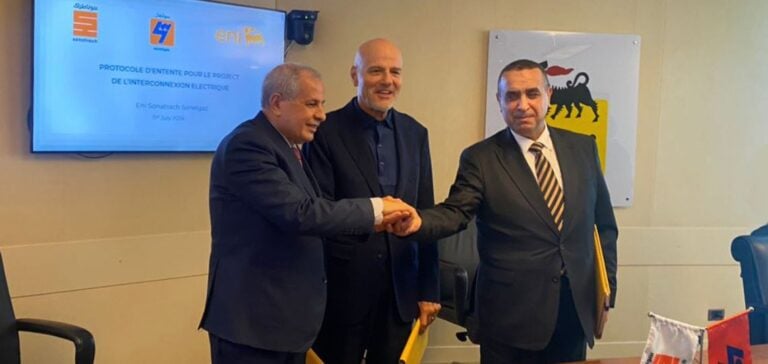Algeria’s energy sector is gearing up for a significant transformation with the signing of a memorandum of understanding between SONATRACH, Algeria’s national oil and gas company, SONELGAZ, the electricity and natural gas distributor, and Italy’s ENI S.P.A. The agreement covers feasibility studies for a project to interconnect the Algerian and Italian electricity grids via a submarine cable.
The aim of the project is to exchange or supply electricity to the Italian and European markets.
The joint press release from the three entities underlines the strategic importance of this ground-breaking project, which could transform Algeria into an energy hub for Europe.
This development strengthens the existing cooperation between SONATRACH and ENI, established in the memorandums of intent signed on January 23, 2023 in Algiers.
These agreements provide for the implementation of future joint projects, focusing on energy supply, energy transition and decarbonization.
Economic and environmental implications
The electricity interconnection project between Algeria and Italy is of vital importance not only for the two countries, but also for Europe.
It represents a decisive step towards integrating Mediterranean power grids and securing energy supplies in Europe.
This initiative is part of a global drive for energy transition and carbon emission reduction, in line with the European Union’s environmental objectives. Algeria, rich in energy resources, is positioning itself as a key player in the European energy market.
By diversifying its energy exports, the country could strengthen its economic stability and attract significant foreign investment.
Technical and logistical challenges
The project nevertheless poses a number of technical and logistical challenges.
Building a submarine cable of this scale requires advanced technological expertise and considerable investment.
Feasibility studies conducted by SONATRACH, SONELGAZ and ENI will have to assess geological, environmental and economic aspects to ensure the viability of the project.
In addition, the interconnection of power grids will require close coordination between regulators and operators in both countries to ensure smooth and efficient integration.
Collaboration between Algerian and Italian companies could also pave the way for other energy infrastructure projects in the region.
Cooperation prospects
This agreement marks an important milestone in the relationship between Algeria and Italy, and more broadly between Algeria and Europe.
It testifies to the determination of both countries to strengthen their cooperation in the energy field, and to contribute to energy security in the region.
The development of this project could also have positive repercussions on economic and political relations between the two shores of the Mediterranean.
As a reliable and strategic energy supplier, Algeria could play a crucial role in Europe’s energy transition and the promotion of renewable energies.






















